Center for Health Equity Newsletter
November 2020

In this newsletter:
Greetings from the Center for Health Equity
Message from the Director
CONNECT: MDH launches COVID-19 Community Coordinators initiative
STRENGTHEN: New model of community partnership amid COVID
AMPLIFY: Guest story by Indigenous breastfeeding counselor Takayla Lightfield
Greetings from the Center for Health Equity
To borrow a phrase, what a year this week has been. As our staff continue to juggle ongoing equity work while contributing to and even leading many of MDH's COVID-19 response efforts, we take this time to share with you some important updates.
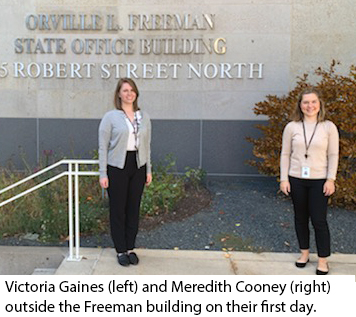 First, we’d like to introduce the two newest members of Center for Health Equity team: Meredith Cooney and Victoria Gaines. Meredith and Victoria joined our team through the Centers for Disease Control and Prevention (CDC) Public Health Associate Program earlier this fall. Meredith graduated from Franklin & Marshall College with a joint degree in Public Health and Business Organizations of Society, and she is passionate about how public health systems impact different communities globally, nationally, and locally. Victoria received her MA in sociology from the University of Memphis, and went on to teach at the university for a year while studying trauma science and resilience as a means of preventing violence and injury. Welcome, Meredith and Victoria!
First, we’d like to introduce the two newest members of Center for Health Equity team: Meredith Cooney and Victoria Gaines. Meredith and Victoria joined our team through the Centers for Disease Control and Prevention (CDC) Public Health Associate Program earlier this fall. Meredith graduated from Franklin & Marshall College with a joint degree in Public Health and Business Organizations of Society, and she is passionate about how public health systems impact different communities globally, nationally, and locally. Victoria received her MA in sociology from the University of Memphis, and went on to teach at the university for a year while studying trauma science and resilience as a means of preventing violence and injury. Welcome, Meredith and Victoria!
 Next, we would also like to recognize our newest Health Equity Advisory and Leadership (HEAL) Council co-chair, Jennifer Nguyễn Moore. Jennifer has served on the HEAL Council since it’s inception in 2018. She currently works as a recycling and organics administrator at the Minnesota Pollution Control Agency, working to reduce consumption while protecting our human health and natural resources. Jennifer will co-chair the committee with continuing co-chair Dr. Jokho Farah. We are grateful to Va Yang, previous HEAL Co-Chair, for her service. We wish Va well on her next endeavors as she leaves Minnesota.
Next, we would also like to recognize our newest Health Equity Advisory and Leadership (HEAL) Council co-chair, Jennifer Nguyễn Moore. Jennifer has served on the HEAL Council since it’s inception in 2018. She currently works as a recycling and organics administrator at the Minnesota Pollution Control Agency, working to reduce consumption while protecting our human health and natural resources. Jennifer will co-chair the committee with continuing co-chair Dr. Jokho Farah. We are grateful to Va Yang, previous HEAL Co-Chair, for her service. We wish Va well on her next endeavors as she leaves Minnesota.
 We’d like to congratulate long-time health equity champion and CHE team member Betty Hiller as she begins to wrap up 26 incredible years of state service at MDH. Betty started at MDH in 1994 in the Office of Health Facility Complaints as a support staff. In 1997, she transferred to the Center for Health Statistics as a field representative where she was responsible for installing the electronic birth and death certificates on hospital and county courthouse computer systems and training the staff on how to use the system all over the state of Minnesota. Betty also spent 15 years working with the Minnesota WIC program as a vendor assistant and then in financial management before joining the Center for Health Equity in 2014 to support the Eliminating Health Disparities Initiative program. She also worked in the Agency Project Planning unit for a couple years until 2019, before she transferred back to the Center for Health Equity. Most recently, Betty has served as a health equity specialist, helping to advance countless equity initiatives including Advancing Racial Equity trainings for staff across the department.
We’d like to congratulate long-time health equity champion and CHE team member Betty Hiller as she begins to wrap up 26 incredible years of state service at MDH. Betty started at MDH in 1994 in the Office of Health Facility Complaints as a support staff. In 1997, she transferred to the Center for Health Statistics as a field representative where she was responsible for installing the electronic birth and death certificates on hospital and county courthouse computer systems and training the staff on how to use the system all over the state of Minnesota. Betty also spent 15 years working with the Minnesota WIC program as a vendor assistant and then in financial management before joining the Center for Health Equity in 2014 to support the Eliminating Health Disparities Initiative program. She also worked in the Agency Project Planning unit for a couple years until 2019, before she transferred back to the Center for Health Equity. Most recently, Betty has served as a health equity specialist, helping to advance countless equity initiatives including Advancing Racial Equity trainings for staff across the department.
This summer, Betty decided to postpone her retirement by several months to continue serving African American communities as a contract manager and community liaison in the COVID-19 response, and she has provided invaluable leadership and support for community testing events and our many community partners in this work. As we prepare for Betty’s exciting and well-deserved transition in January, we want to recognize her outstanding contributions to our team, to our community, and to our efforts to advance health equity for all Minnesotans. Betty, you will be missed beyond words!
Interested in being a guest writer for a future newsletter?
Email your idea to health.equity@state.mn.us and we will be in touch!
Message from the Director
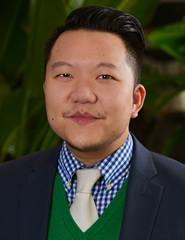 2020 has been hard. That’s an understatement, I know. As we look back at all that has transpired in 2020, I would guess that most of us would not have anticipated all that has occurred. Our lives have been flipped upside down. We have lost so many loved ones. We have lost jobs. We have made sacrifices and many of us continue to struggle to make ends meet.
2020 has been hard. That’s an understatement, I know. As we look back at all that has transpired in 2020, I would guess that most of us would not have anticipated all that has occurred. Our lives have been flipped upside down. We have lost so many loved ones. We have lost jobs. We have made sacrifices and many of us continue to struggle to make ends meet.
2020 has tested us. The test is not over. When my eyes have glazed over from 8 hours of virtual meetings, I wonder how I will keep this up. There are days when I don’t know how I will make it through my work day because my family is suffering from COVID or I am mourning the loss of yet another loved one. I think about my friends who are health providers and on the front lines each day—who have gotten COVID and had to quarantine themselves to not infect their families. I think about my loved ones who work in restaurants and factories, putting their lives on the line to keep America functioning. I think about my public health colleagues across the country who are fighting every day to keep society safe, often at the cost of their health, sleep, or family needs.
2020 was a global reset. It presented an opportunity to (re)evaluate our relationships: with nature and the environment, with our neighbors, with our careers, with our loved ones and with ourselves. Every day we are challenged and pushed to explore the depths of our compassion and our courage. As we move into the next season, and the next phase of this pandemic, it will require that we continue to delve into these depths. What stories do we want to tell our children or grandchildren in 20 years when we talk about 2020? What roles will we be proud to have played? What will we wish we had done? As we move into 2021, we must continue building systems that heal rather than harm. We must center our humanity. And we must never give up our belief that all humans deserve dignity, respect and the opportunity to create their healthiest futures.
Kou Thao
Director, Center for Health Equity
CONNECT
We are a network hub – leading, connecting and strengthening networks of health equity leaders and partners across MDH and Minnesota communities.
MDH launches COVID-19 Community Coordinators initiative to support communities most impacted by pandemic
 MDH is working with community organizations to fight COVID-19 through a new program called COVID-19 Community Coordinators (CCC). The program launched this fall with nearly 40 community-based organizations prepared to serve Minnesotans most likely to be impacted by COVID-19, including communities of color, American Indians, LGBTQ, and disability communities. The goal of the initiative is to leverage community strengths and trusted community networks to help community members navigate to critical resources in partnership with the state, local and tribal public health, and community organizations.
MDH is working with community organizations to fight COVID-19 through a new program called COVID-19 Community Coordinators (CCC). The program launched this fall with nearly 40 community-based organizations prepared to serve Minnesotans most likely to be impacted by COVID-19, including communities of color, American Indians, LGBTQ, and disability communities. The goal of the initiative is to leverage community strengths and trusted community networks to help community members navigate to critical resources in partnership with the state, local and tribal public health, and community organizations.
Each partner organization shares important community insights with MDH on the best ways to meet community needs during the COVID-19 pandemic. COVID Community Coordinators are also equipped to help Minnesotans navigate systems in their native language and with cultural communities in mind. Briva Health is one such example.
"Briva Health is working to ensure communities facing COVID-19 disparities navigate to critical resources needed during this pandemic; our collective efforts are having a significant impact on people's lives and we are grateful to be part of this important response effort,” said Hodan Guled of Briva Health.
Community-specific outreach is helping to address the multifaceted health and essential needs of individuals and families. To accomplish this complex task, some organizations have elected to partner with other organizations, such as the African American Leadership Forum and Phyllis Wheatley Community Center.
“The African American Leadership Forum (AALF) and Phyllis Wheatley Community Center are working together to support Minnesota’s African American community by developing a Minnesota Black Community COVID-19 Hotline where callers are connected to health, financial, childcare, and housing resources, as well as other supportive services, to assist them throughout the pandemic. The hotline is a valuable resource for the Black community, as it addresses the impacts of both the pandemic and systemic racism,” said Rebecca Nichloson of the African American Leadership Forum.
MDH is currently partnering with the following organizations to serve as COVID Community Coordinators in their racial, ethnic, or cultural communities:
- African American Leadership Forum
- African Career, Education & Resources, Inc. (ACER)
- African Immigrant Community Services (AICS)
- American Indian Community Housing Organization
- Briva Health
- CAPI USA
- Comunidades Latinas Unidas En Servicio (CLUES)
- Comunidades Organizando el Poder y la Acción Latina (COPAL)
- Cultural Wellness Center
- Department of Indian Work – Interfaith Action of Greater Saint Paul
- Hispanic Advocacy and Community Empowerment through Research (HACER)
- Hmong American Partnership
- Islamic Association of North America
- JustUs Health
- Northwest Indian Community Development Center
- Stairstep Foundation
- Tserha Aryam Kidist Selassie (TAKS)
- Vietnamese Social Services of Minnesota
- WellShare International
Additional community-based organizations serving disability and immigrant and refugee communities are funded through the Department of Human Services and the Department of Employment and Economic Development.
For more information about the program or to find a COVID-19 Community Coordinator in your cultural community, county, or language preference, visit the COVID-19 Community Coordinators webpage.
STRENGTHEN
We provide leadership in advancing health equity and cultivate health equity leaders within MDH and across Minnesota communities.
MDH forges a new model of community partnership through COVID-19 response
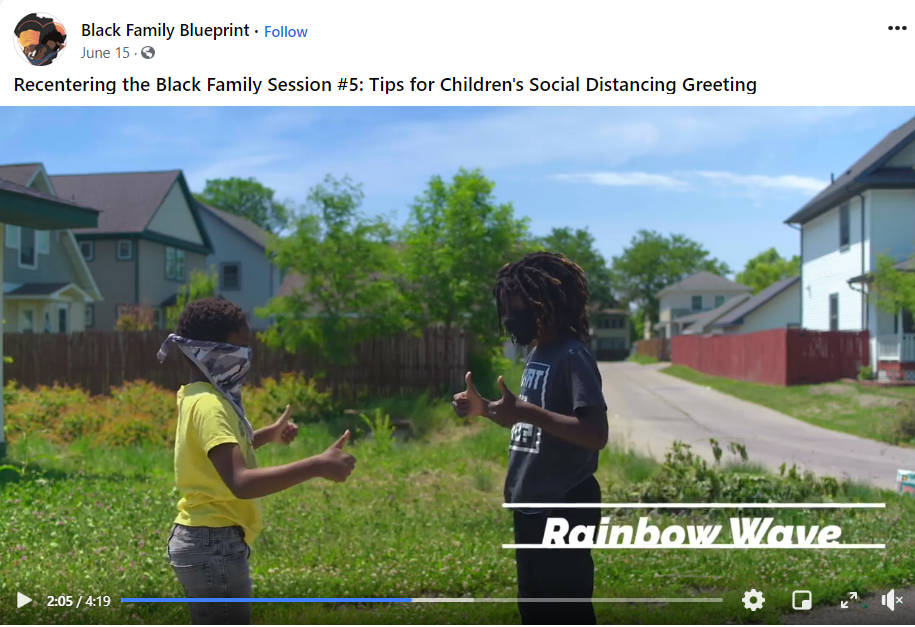
Early in the COVID-19 response, experienced community engagement professionals at MDH identified the need to work with trusted community sources to ensure that all Minnesotans receive critical information in a timely manner. Community members and public health professionals alike agree on the importance of translated health messages with culturally relevant images. “Throughout our diverse communities in Minnesota, we all have different preferences for where we get our trusted information or our health information. We have different linguistic needs and we perceive messages in different ways, depending on our cultures and our backgrounds,” shared Bridget Pouladian, leader of the Contracts Team of the Cultural, Faith, and Disabilities Branch of the MDH COVID-19 Response. “We really needed to work with trusted community partners to make sure that the COVID-19 messages that were so important for communities to hear and understand were culturally relevant, linguistically appropriate, accurate, and timely.”
These principles inspired the Cultural, Faith, and Disabilities Communities Branch of the MDH COVID-19 response to build a process for contracting with trusted diverse media vendors and community-based organizations, in order to create and share culturally-relevant COVID-19 education messages and materials. This program has had a wide reach across diverse communities in Minnesota and has proved to be a mutually valuable model for community engagement.
So far this year, as part of the COVID-19 public health response, MDH has partnered with more than 120 diverse media vendors and community-based organizations to engage people about health messaging as part of the COVID-19 public health response. These organizations are tasked with ensuring that all people residing in Minnesota and the 11 Tribal Nations that share its geography –– including residents from communities of color, American Indian residents, LGBTQ residents, and residents with limited English proficiency –– have access to accurate messages about COVID-19. Because of their existing relationships with and intimate knowledge of the communities they serve, these organizations are able to provide trusted, timely, and culturally-relevant health information to diverse communities across the state. Ensuring access to these messages is especially critical for these communities because data has shown the disproportionate impact of COVID-19 on communities of color and American Indians
The community engagement model
The partnership between MDH and the community contractors extends beyond funding. Each community-based organization or diverse media vendor is partnered with a contract manager at MDH to ensure they always have a responsive entry point into the department. The contract manager works collaboratively with MDH community liaisons to provide a direct line of communication to and from the MDH COVID-19 response efforts, support the development of communications materials, and respond to questions and concerns from their communities.
The dedication to two-way communication and collaboration in these contracts has proved to be an effective and collaborative model that both MDH staff and contractors are eager to replicate even beyond the COVID-19 response. Each contractor has met virtually with their contract manager and community liaison in a small group of other contractors from their cultural community either weekly or biweekly to discuss their progress toward goals, their community’s needs, and their questions of MDH. These frequent, conversational touch points have provided an opportunity for relationship-building with communities often marginalized by government, and for community voices to have a direct pathway into the COVID-19 response.
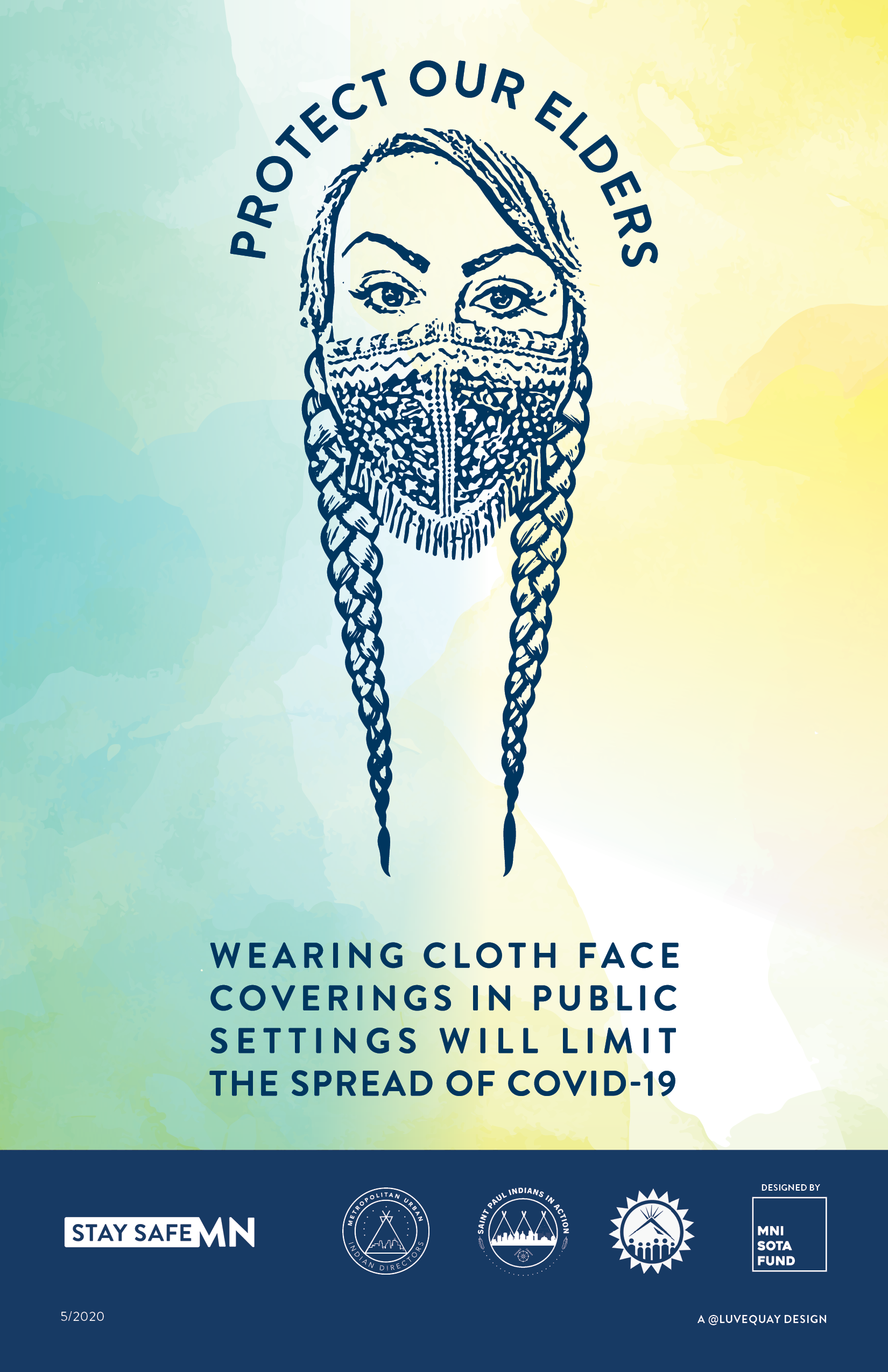 Julie Dalton, a contract manager for community contractors at MDH, noted that this approach to contracting has allowed for valuable communication between MDH and community partners, as well as proactive problem solving rather than reactive responses. For the first few months of her reassignment to the COVID-19 response, Julie worked closely with American Indian community contractors. As their contract manager, she met weekly in a small, virtual group with contractors from the American Indian community and the MDH American Indian community liaison, Kathy Denman-Wilke, to provide updates and hold discussions. “Every week they had the opportunity to share challenges and successes, and they were able to problem solve and share resources together,” shared Julie. After each call, Julie and Kathy took back their concerns to their colleagues within the department, and found solutions to resolve them by working with staff across the agency. They worked together to ensure a quick response time for addressing community concerns.
Julie Dalton, a contract manager for community contractors at MDH, noted that this approach to contracting has allowed for valuable communication between MDH and community partners, as well as proactive problem solving rather than reactive responses. For the first few months of her reassignment to the COVID-19 response, Julie worked closely with American Indian community contractors. As their contract manager, she met weekly in a small, virtual group with contractors from the American Indian community and the MDH American Indian community liaison, Kathy Denman-Wilke, to provide updates and hold discussions. “Every week they had the opportunity to share challenges and successes, and they were able to problem solve and share resources together,” shared Julie. After each call, Julie and Kathy took back their concerns to their colleagues within the department, and found solutions to resolve them by working with staff across the agency. They worked together to ensure a quick response time for addressing community concerns.
While the model has been successful in many ways, one of the biggest challenges with this approach has been balancing the time commitments of MDH staff assigned to this work. The contract managers team faces significant turnover as MDH staff are rotated on and off the COVID-19 response in order to keep up with their normal work duties. Nevertheless, the contracts and community liaisons teams have invested their efforts in ensuring as much consistency and relationship-building as possible with community contractors, even amid staffing changes.
Continuing the impact
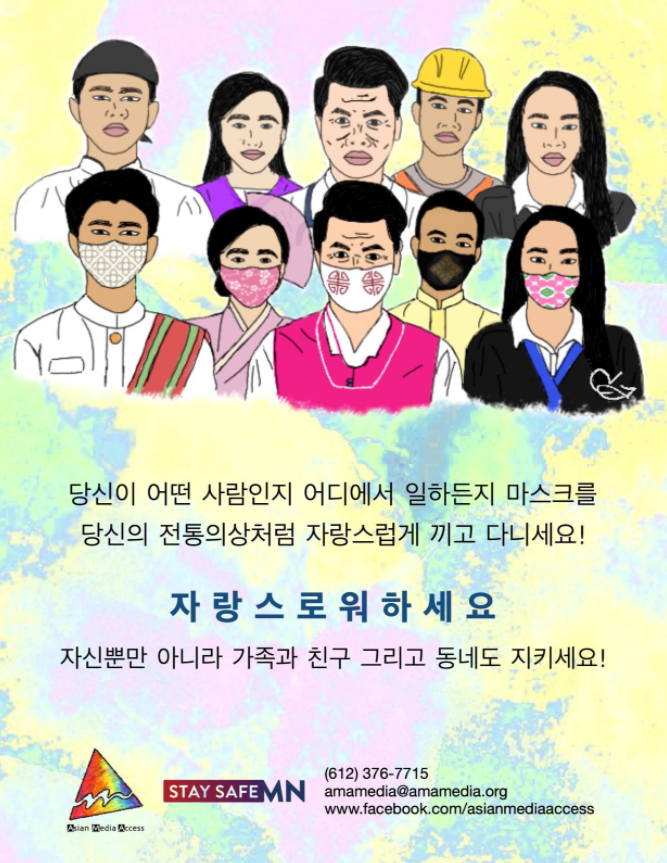
As of August 2020, community contractors reported providing direct COVID-19 information or services to over 25,000 community members combined. This work included over 50 unique printed communications, 250 online communications, and 20 radio or TV broadcasts. Social media messages amassed over 12 million views. Some examples of both community and diverse media contractors’ work can be found on the COVID-19 Examples of Contractor Materials and Messages page.
Contractors have also viewed this approach as beneficial. The directors of Black Family Blueprint, one of the diverse media contractors, noted: “We encourage MDH to continue with this method to find trustworthy and authentic partners within the community to convert pertinent information to respective communities...This is a vitally important notion because effective community partnerships exist with the realm of autonomous accountability and trustworthy support.”
Partnering with trusted community organizations to reach Minnesotans with important messaging around COVID-19 has been a success that both MDH staff and community organizations hope to see continued. 3HmongTV, a diverse media contractor, shared: “Our relationship with MDH and the important work that we provide to communities of color is so important. The trust between government and diverse communities is by working together on issues and letting them know that we all care about all people, not excluding anyone in the state of Minnesota.”
To learn more about the MDH COVID-19 community contractors, please visit our COVID-19 Contracts for Diverse Media Messaging and Community Outreach webpage.
AMPLIFY
We amplify the work of communities most impacted by health inequities and support them to drive their own solutions.
My Story: From breastfeeding mom to Indigenous breastfeeding counselor
by Takayla Lightfield
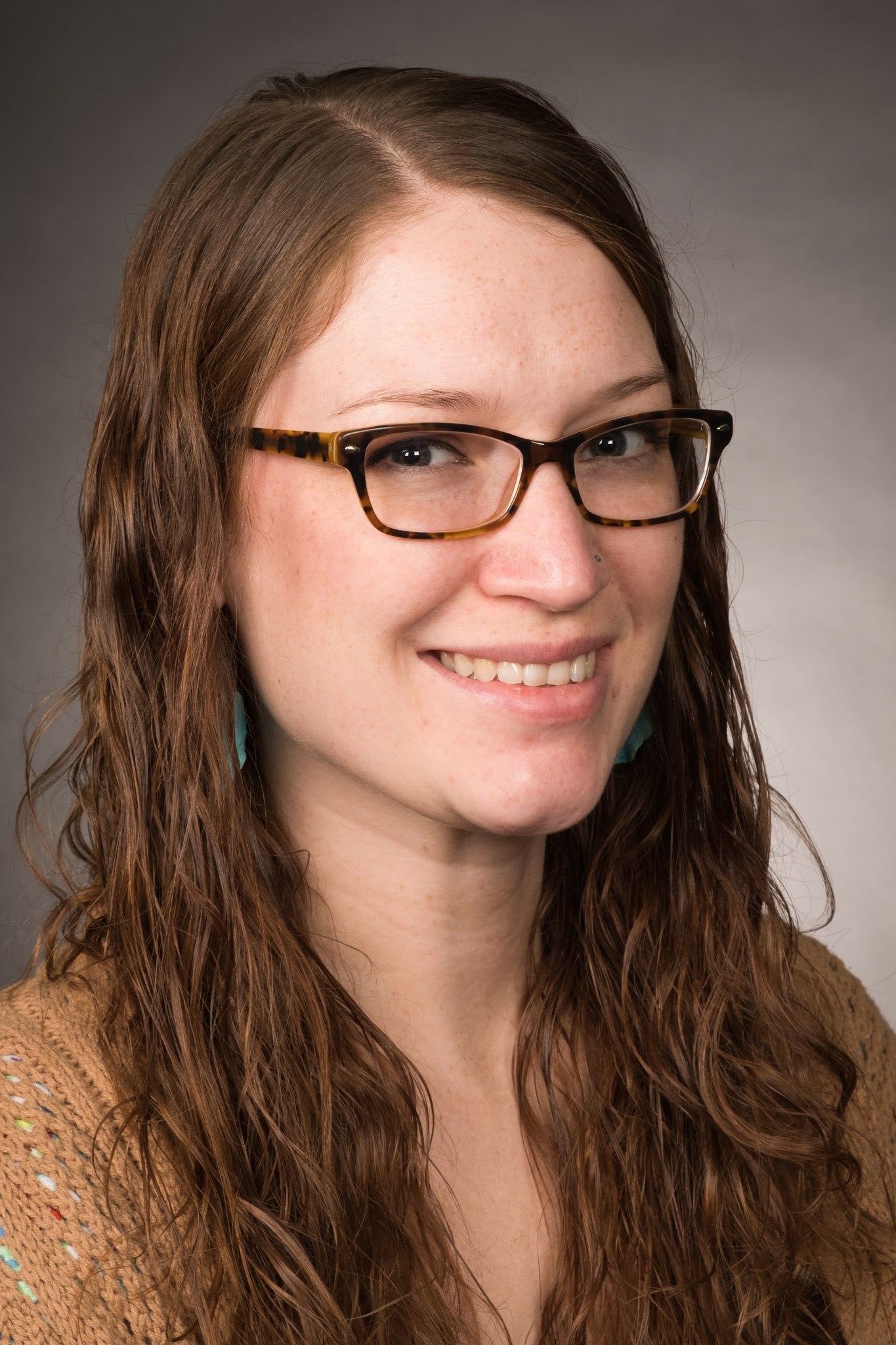 My daughter has a beautiful birth story. I had a lot of support surrounding me, including my husband, my mom, and my doula. I felt informed and prepared for labor and her birth; however, soon after giving birth I started having a difficult time breastfeeding. I was fortunate to have access to several resources in the Twin Cities, and am most grateful for my peer breastfeeding mentor through the Women, Infants, and Children (WIC) program. I could call or text her anytime day or night, and she would respond. She encouraged me to continue with my breastfeeding goals when I wanted to give up, and she validated what I was going through when no one else seemed to understand. Having these resources was amazing, but the one thing missing for me in this experience was a sense of community.
My daughter has a beautiful birth story. I had a lot of support surrounding me, including my husband, my mom, and my doula. I felt informed and prepared for labor and her birth; however, soon after giving birth I started having a difficult time breastfeeding. I was fortunate to have access to several resources in the Twin Cities, and am most grateful for my peer breastfeeding mentor through the Women, Infants, and Children (WIC) program. I could call or text her anytime day or night, and she would respond. She encouraged me to continue with my breastfeeding goals when I wanted to give up, and she validated what I was going through when no one else seemed to understand. Having these resources was amazing, but the one thing missing for me in this experience was a sense of community.
While in labor with my daughter, I thought to myself, “I want to do this. I want to support other families during birth.” In 2016, I completed my first labor and delivery doula training, and began contracting with the Division of Indian Work’s Ninde (My Heart) Doula Program and have been working with them for the last four years. Because of my struggles in breastfeeding, I had a desire to help other families on their journey, so in 2018 I became a certified Indigenous Breastfeeding Counselor, expanding my skill set to be able to help families in areas beyond labor and birth.
Ninde has expanded over the years; we have fifteen certified doulas and are able to offer services at no cost to American Indian and Latinx families. This year our goal was to support over 50 families, but COVID-19 had other plans and doulas were not allowed in hospitals for the first few months of the pandemic. We have had to be creative in order to support these families while also protecting their safety.
A group of Indigenous Breastfeeding Counselors and birth workers applied for a Minnesota Department of Health COVID-19 community engagement funding opportunity to provide virtual support to Indigenous families during the pandemic. We received the funding and Nitamising Gimashkikinaan (First Medicine) was born. We offer virtual bimonthly lactation and perinatal support circles. During each support circle we do activities together, such as making dream catchers, breast pins, or breastfeeding affirmations. We also invite guest speakers to come share their traditional knowledge with the group. We open it up for questions and sharing to cover a wide range of topics in the two-hour time span. We also have a Facebook group where people can ask lactation questions. During our zoom meetings and on our Facebook group, we provide up-to-date information on COVID-19, including free testing sites, free masks, any changes in guidelines, and culturally-appropriate resources.
I am proud when my daughter tells people that I “work with the babies.” I am proud of the way we have been able to adapt during these difficult times and continue to support families. But I am most proud of the community we have created together.
If you know of any families who are pregnant or providing human milk to an Indigenous baby, please refer them to our Facebook group - Indigenous Perinatal and Lactation Support Circle -Nitamising Gimashkikinaan - but please note that this is a safe space reserved for Indigenous families.
Takayla Lightfield is an enrolled member of the Cheyenne River Sioux Tribe of South Dakota, Mnicoujou Lakota band. She is a certified doula, Indigenous breastfeeding counselor, and perinatal educator who primarily works with American Indian families living in Minneapolis, Minnesota, and the surrounding area. She is also the Co-leader of the Indigenous Breastfeeding Coalition of Minnesota.